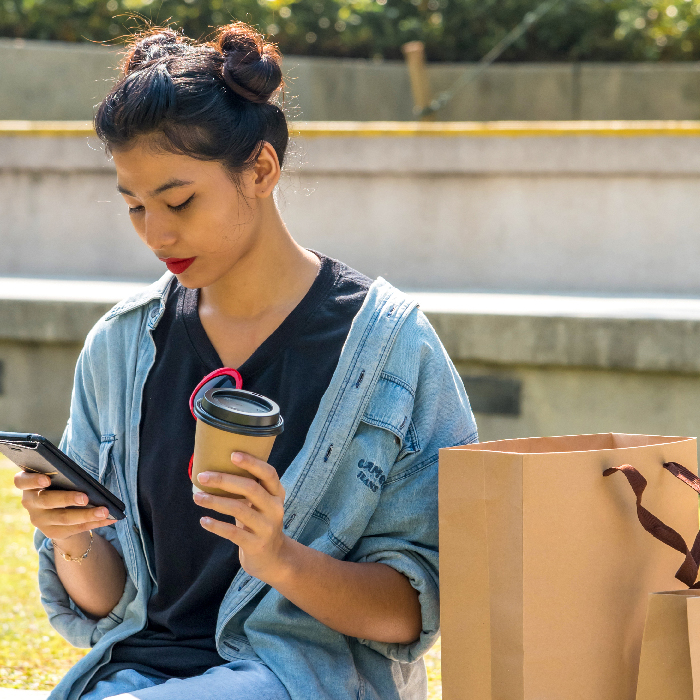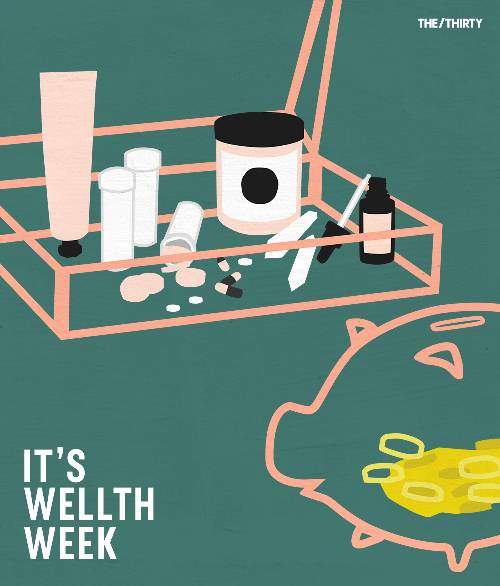This Is Your Brain on Shopping


While financial stress isn't exactly a novel concept, our generation definitely feels the pinch more than ever: Research shows that one in three millennials experience anxiety about money. That's why this week, we're tackling financial wellness from every angle. Get expert advice on everything from the psychology of saving to investing when you have no clue where to begin. Financial empowerment is the ultimate goal, but you just might raise your bottom line, too.
Do you ever find yourself inserting your credit card into that unholy little machine or clicking "confirm purchase" online even though you logically know it is completely unwise for you to be spending $350 on more workout apparel or makeup or throw pillows for your couch? Um yeah, we do too. It feels almost bigger than us—that rush of spending money you may or may not have on something you may or may not need or even want. We were curious to understand what exactly is going on in the body and brain to make shopping feel so naughty and exciting—and sometimes addictive. So we hit up Melina Palmer, a behavioral economist and host of the podcast The Brainy Business: Understanding the Psychology of Why People Buy, to break it down. Read on to see what she had to say about your brain on shopping.
What Exactly Causes That Shopping Rush?
That high we experience while spending money—it's a real physiological thing. As Palmer explains, "Dopamine is released during anticipation of the buy, the excitement of wearing or using the item at hand, and dreaming of what we will be like (the type of person we will be) if we own that item."
What Makes Us Hit "Confirm Purchase"?
If the idea of owning something is enough to give us that happy rush, why do we feel the need to actually buy? In other words, "Why do we feel the need to get and have the things instead of merely experiencing them in the moment?" asks Palmer. Most of what pushes us to actually whip out our credit cards can be attributed to something called loss aversion and perceived ownership. The way Palmer explains it, our brains claim ownership over things incredibly quickly—especially when we physically touch them—inciting instant desperation to not let them go. "We value items more when we have them, and we love the idea of having lots and lots of things," says Palmer. "Again, these are fueled by dopamine rewards (which our brains are seeking all the time)."
Is There a Difference Between Shopping IRL vs. Online?
If touching an item strengthens the desire to own it, you might deduce that online shopping might be safer. "Online and in person can impact the brain differently because the power of touch really influences perceived ownership," says Palmer. But the hyper-lifelike sensory experiences offered by most shopping sites can make you feel like you're in the physical presence of something even if you're not. As Palmer explains, "Good visuals can trick the brain into seeing and 'mentally touching' textures and things via our sense of sight and mirror neurons"—neurons that help simulate in a shopper the same emotional experience of, say, a model in a photo online.
When Does Shopping Become Addictive?
These chemical rewards are what can turn shopping into an addiction. Shopping addiction is most likely to develop when you're deprived of other rewards (maybe food, sex, etc.) or are feeling stressed or overwhelmed. These experiences cause your brain to start looking for boosts of dopamine and oxytocin elsewhere. "When the brain is overwhelmed by stress, clutter, crazy families, or jobs, the conscious brain is less likely to take control, and our subconscious is more likely to call the shots," says Palmer, "which means more purchases, bad eating choices, and search for rewards."
Addressing these underlying stressors—whether that's through therapy, meditation, or some combination of self-care practices—can ultimately help curb that chemical desire to spend all your cash.

Next: how to deal with money-related anxiety.
This article is provided for informational purposes only and is not intended to be used in the place of advice of your physician or other medical professionals. You should always consult with your doctor or healthcare provider first with any health-related questions.

Tie among Linda Rodin, Hari Nef, and David Bowie.
Who are your 5 favorite people to follow on Instagram?@petracollins @katiejanehughes @alwaysjudging @bonnyrebecca @hotdudesreading
What's the beauty essential you can’t live without?If I have some brow gel and Sisley's Phyto-Lip Twist, I'm good to go forever.
What's your desert island album?Death Cab for Cutie's Transatlanticism
What's your favorite Byrdie.com story?Game of Thrones's Nathalie Emmanuel looks so achingly beautiful in our feature with her that I think it's gonna have to be that!